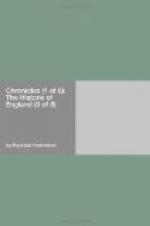The reuerend father Bede writing of this matter, saith thus: After that Cesar being returned into Gallia, had placed his souldiors abroad in the countrie to soiorne for the winter season, he caused ships to be made readie, to the number of 600, with the which repassing into Britaine, whilest he marched foorth with a mightie armie against the enimies, his ships that lay at anchor being taken with a sore tempest, were either beaten one against another, or else cast vpon the flats and sands, and so broken; so that fortie of them were vtterlie perished, and the residue with great difficultie were repaired. The horssemen of the Romans at the first encounter were put to the worsse, and Labienus the tribune slaine. In the second conflict he vanquished the Britains, not without great danger of his people. After this, he marched to the riuer of Thames, which as then was passable by foord onelie in one place and not else, as the report goeth. On the further banke of that riuer, Cassibellane was incamped with an huge multitude of enimies, and had pitcht and set the banke, and almost all the [Sidenote: The stakes remained to be seene in Bedes daies.] foord vnder the water full of sharpe stakes, the tokens of which vnto this day are to be seene, and it seemeth to the beholders that euerie of these stakes are as big as a mans thigh, sticking fast in the bottome of the riuer closed with lead. This being perceiued of the Romans, and auoided, the Britains not able to susteine the violent impression of the Roman legions, hid themselues in the woods, out of the which by often issues, they greeuouslie and manie times assailed the Romans, and did them great damage. In the meane time the strong citie of Troinouant with hir duke Androgeus deliuering fortie hostages, yeelded vnto Cesar, whose example manie other cities following, allied themselues with the Romans, by whose information Cesar with sore fight tooke at length the towne of Cassibellane, situat betwixt two marches, fensed also with the couert of woods, & hauing within it great plentie of all things. After this Cesar returned into France, and bestowed his armie in places to soiorne there for the winter season.
The Scotish writers report, that the Britains, after the Romans were the first time repelled (as before ye haue heard) refused to receiue the aid of the Scotish men the second time, and so were vanquished, as in the Scotish historie ye may see more at length expressed. Thus much touching the war which Iulius Cesar made against the Britains, in bringing them vnder tribute to the Romans. But this tributarie subiection was hardlie mainteined for a season.




